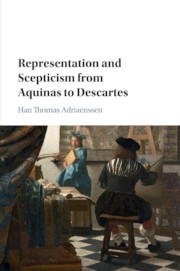Conclusion
Published online by Cambridge University Press: 13 July 2017
Summary
When Descartes broke with scholastic hylomorphism, the concomitant theory of cognition as formal assimilation came under pressure too. In its place came a philosophy of ideas that, in the eyes of many of Descartes's contemporaries, ruled out direct access to the external world. And the fear that occupied his readers was that, if we cannot see things directly, maybe we do not think about them at all. And to the extent that we do, we may for all we know be mistaken many more times than we would hope and think. Sceptical worries about our access to the world thus came on the coat tails of a new theory of cognition and representation. As Hilary Putnam once put the point, it was Descartes's ‘disastrous idea’ that we see the world through the interface of ideas in the mind that gave birth to a difficulty, which has remained with us ever since, of seeing how we could ‘be in genuine contact with the external world’.
But as our knowledge of medieval psychology has increased, the idea that worries about the drawbacks about indirect cognition are a typically modern phenomenon has become increasingly hard to sustain. Thus thanks to the studies of Robert Pasnau, Christophe Grellard, Henrik Lagerlund and Dominik Perler, for example, we now know that sceptical arguments were eagerly discussed by medieval philosophers and theologians, and that the pitfalls of indirect realism were hotly debated in the medieval universities. And medievalists have not unoften observed that the criticism of species in authors such as Olivi and Ockham looks remarkably similar to the later critique of ideas in the reception of Descartes.
Thus as one scholar has put it, in these Franciscan discussions of cognition and indirect realism, we find just the kind of difficulty that ‘the critics of the theory of ideas singled out as the main problem of representationalism’. Again, scholars who have explored the scholastic background to the Cartesian theory of ideas, find that the critical reception of ideas was foreshadowed by medieval scepticism about species. Thus, Olivi's argument against species, it has been claimed, was ‘basically the same’ as the veil-of-ideas criticism leveled against Descartes in the seventeenth century.
- Type
- Chapter
- Information
- Representation and Scepticism from Aquinas to Descartes , pp. 255 - 259Publisher: Cambridge University PressPrint publication year: 2017



